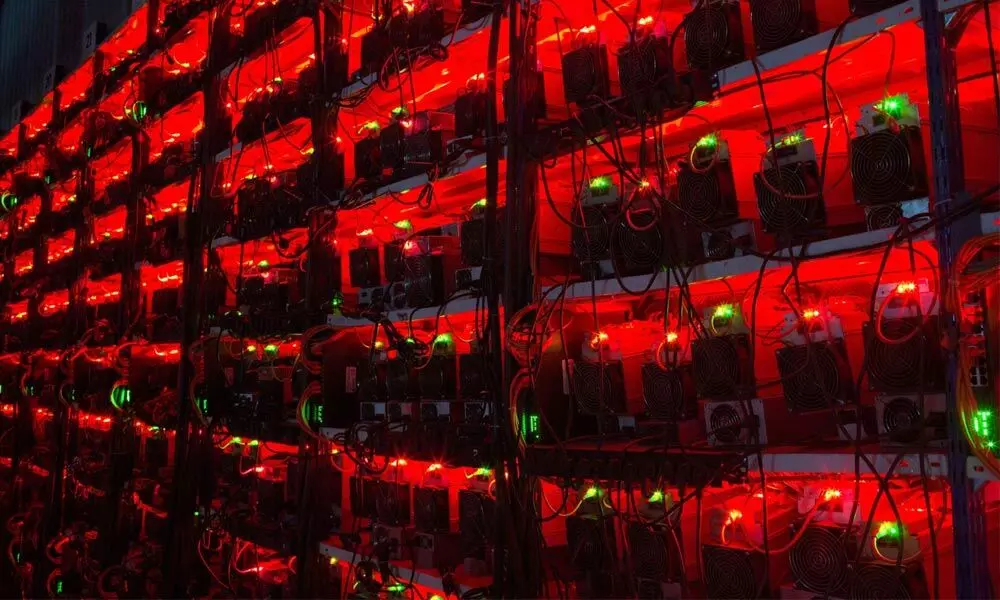Bitcoin is an incredibly dirty business
The Bitcoin algorithm demands increasing amounts of computational power to validate transactions. If it were a country, its annualised estimated carbon footprint would be comparable to New Zealand at about 37 million tons of carbon dioxide
image for illustrative purpose

Speculative digital gold rush is understandable in this pandemic environment of easy money and widespread day-trader FOMO
Institutional investors diving into Bitcoin - namely hedge funds - are eager to promote its unpredictable price swings as the sign of a new asset class in the making. The cryptocurrency has traded at between $5,000 and $40,000 over the past year, and arguing over its true value is like a scholastic spat about angels on a pin. Could it go to six figures? Seven? Is it actually worth nothing at all? The mystery only adds to its allure.
The speculative digital gold rush is understandable in this pandemic environment of easy money and widespread day-trader FOMO. But it's notable that the non-virtual side of Bitcoin buying - namely the energy consumption needed to mine and maintain it - gets far less attention. Instead crypto is regularly lumped in with energy-transition trades such as Tesla Inc, another top retail-investor pick, regardless of the fact that buying Bitcoin pretty clearly makes an investment portfolio 'less green,' as Barclays Private Bank's Gerald Moser put it last week.
The Bitcoin algorithm demands increasing amounts of computational power to validate transactions. If it were a country, its annualised estimated carbon footprint would be comparable to New Zealand at about 37 million tons of carbon dioxide. One Bitcoin transaction would generate the CO2 equivalent to 706,765 swipes of a Visa credit card, according to Digiconomist's closely-followed index, albeit with none of the convenience of plastic. Add in Bitcoin's primary use as a speculative instrument and the frequent regulatory warnings it draws, and it's hard to imagine it ever scoring high on ESG.
Energy estimates aren't an exact science, but the direction of travel for power consumption has been clear. Bitcoin's annual consumption is estimated at around 77.8 terawatt-hours, up from 9.6 terawatt-hours in 2017, according to Digiconomist. Another index, compiled by the Cambridge Centre for Alternative Finance, estimates a higher figure of around 108.4 terawatt-hours. The economics of mining outpaced the average laptop long ago, with firms like Marathon Patent Group Inc. now buying tens of thousands of specialised chips at once to power their crypto farms.
It would be one thing if this were taking place in, say, Sweden, which has a carbon tax of more than 100 euros per metric ton of CO2 (with exemptions), or within the European Union's carbon emissions trading system, with prices at around 34 euros per metric ton. But one paper suggests almost half of the world's Bitcoin mining capacity is situated in southwest China, where power is cheap, less taxed and supplied by coal-fired plants as well as hydroelectricity. The Cambridge Centre for Alternative Finance estimates coal accounts for 38 per cent of miner power.
The defence from Bitcoiners is that this is still 'good' overall: This is energy that would otherwise be wasted, and the share of renewables will grow. The Siberian city of Norilsk, for example, now hosts the Arctic's first crypto farm. It's made from scrap metal, kept cool by sub-zero temperatures and powered by cheap gas and hydropower from mining company (the traditional kind) MMC Norilsk Nickel PJSC.
But these arguments ring hollow. Cheap power usually comes with other costs. Consider recent power blackouts in Iran that were blamed on Bitcoin. Even Ray Dillinger, part of the early digital-cash movement that spawned cryptocurrencies, recently said Bitcoin had wasted "enormous resources of energy" on the back of taxpayer-subsidised electricity with the encouragement of exactly the sort of authoritarian governments it claimed to fight against. A 2020 paper by academics at Dublin City University, Trinity College Dublin and University of Southampton found cryptocurrency trading appeared to have influence on the pricing in large electricity and utilities markets.
Not all cryptocurrencies need energy-hungry, proof-of-work algorithms, but Bitcoin wouldn't go back on its founding rules without a fight. That rigidity is promoted as a feature, and not a bug. Fidelity Digital Assets' defence of Bitcoin's energy inefficiency, for example, is that it gets you Bitcoin in return.
Doing so would also mean shelving the usual false equivalences Bitcoiners draw with supposedly worse wasters of energy, such as central governments. Unlike governments, the closest Bitcoin gets to redistribution of wealth is celebrity-sponsored giveaways, which are at worst predatory hoaxes and at best promotional corporate stunts that offer $11 worth of cryptocurrency to people clearly desperate for far more. Help mine the stuff with a high-end computer and get the chance to heat your greenhouse as well.
Researchers have suggested that alternatives to a carbon tax could include more direct taxation of mining - though with a high likelihood of chasing such activities away.
What would Bitcoin really be worth if, in order to care for the world it set out to revolutionise, it changed its algorithm, or if miners unhooked themselves from cheap power? That's a real price mystery. (Bloomberg)

